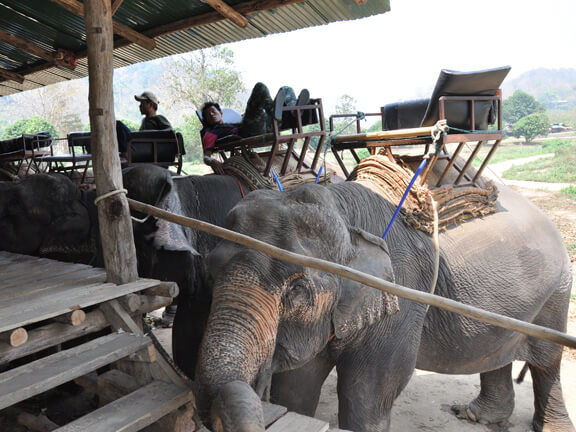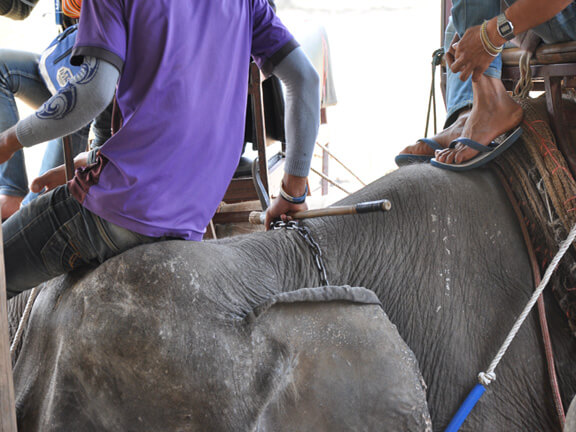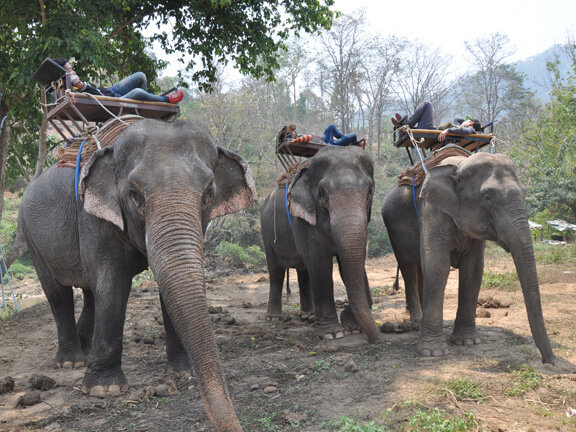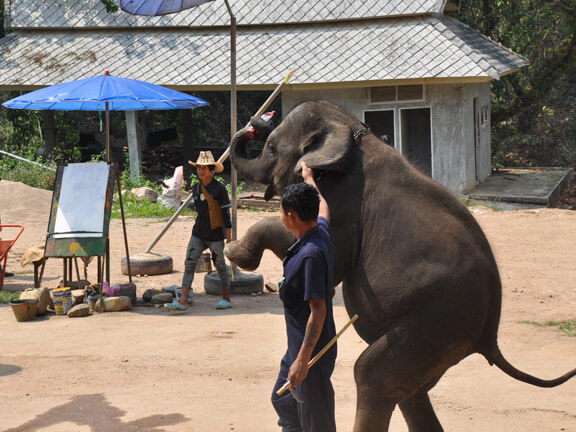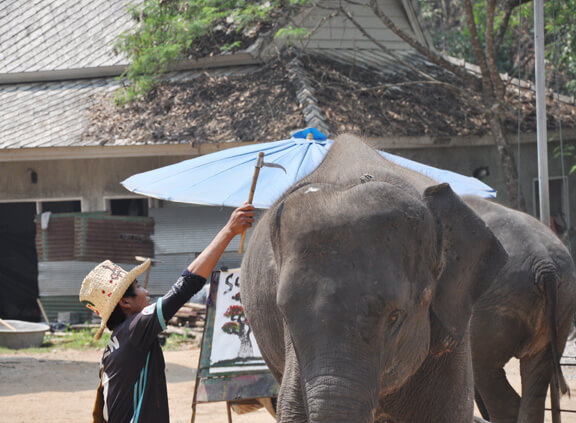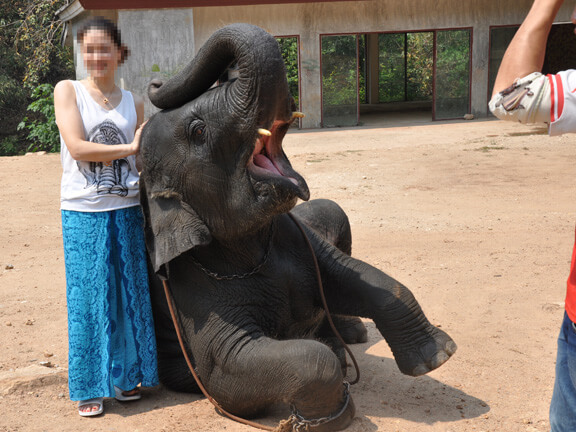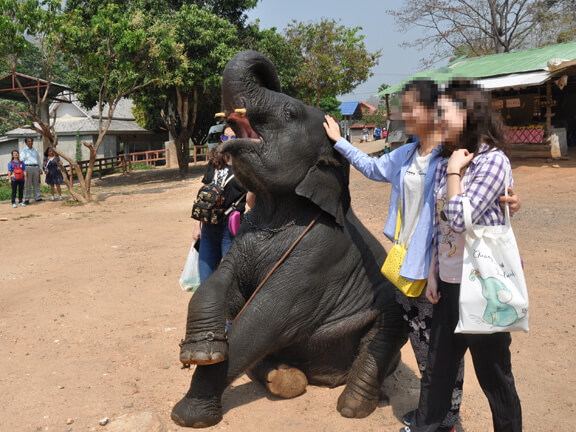Save Elephant Foundation and Elephant Nature Park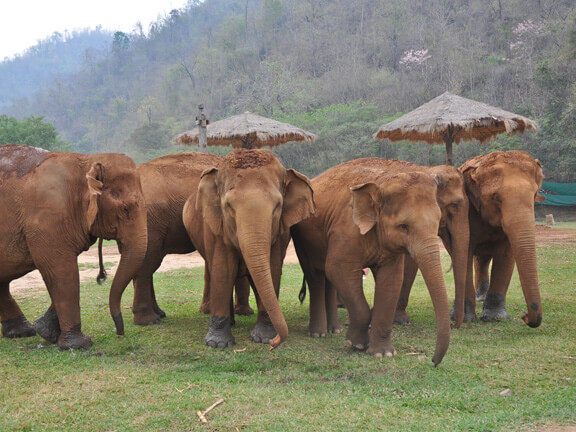
In Thailand we support the Save Elephant Foundation, including the model project Elephant Nature Park (ENP), founded by Lek Chailert. This internationally renowned elephant activist has rescued a formidable number of elephants and also create awareness for the plight of captive and wild elephants on a massive scale, not only in Thailand but also in other countries. As a result, many travel companies have stopped promoting elephant riding or entertainment with elephants like circus shows, elephants painting pictures or giving “massages” to tourists. Every single elephant that is involved in these activities has suffered massive torture and pain (see paragraph “The Horror of Phajaan” below and here). In the idyllic surroundings of ENP these previously abused pachyderms enjoy loving care and a great amount of freedom. Moreover, the gentle giants act as charismatic ambassadors highlighting the tragic situation of this endangered species for visitors from all over the world.
Please also watch the ARTE TV documentary (German):
ACT NOW: THE SPONSORSHIP PROGRAMME
Sponsor an elephant! With 50 euros a year you can support one of these beautiful pachyderms, who were rescued from misery and abuse. They enjoy a new life in Lek Chailert's elephant paradise Elephant Nature Park.
Your donation helps to provide food, veterinary care and everything else that is necessary for an elephant life. You will receive a personal certificate with photos. We will inform you regularly by email about what is going on in the life of your protégé.
Of course you can also visit your sponsored elephant(s) in Elephant Nature Park, a magical place in idyllic surroundings where 3000 rescued animals have found a new home.
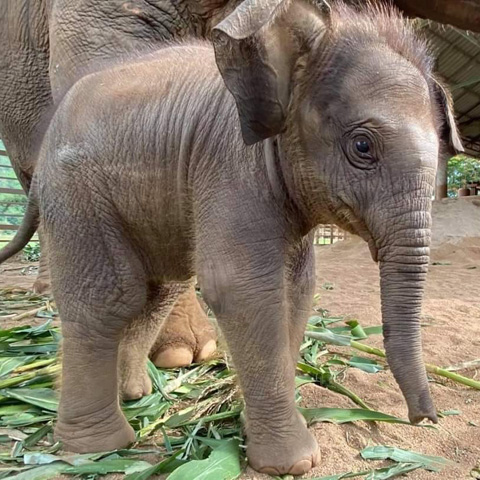
WAN MAI
born May 2, 2020, female
Arrival at ENP: June 2020
Little Wan Mai was born in an elephant riding camp. She was a premature tiny baby, with a strong will to live. Because of the corona crisis, Wan Mai was spared the brutal procedure of the “crush”. Instead, her owner was ready to sell Wan Mai and her mother Mae Mai, and they were rescued together. It is heartwarming to see how Mum and baby have flourished ever since. They have settled in really fast and enjoy the comforts of elephant life, such as mud baths, walks, nutritious food - and of course the company of other elephants. Amazing granny elephant Sri Nuan has instantly fallen in love with Wan Mai and is doing a great job as a nanny. Despite her 61 years she even started lactating, so that the baby can drink from her as well as from her mum.
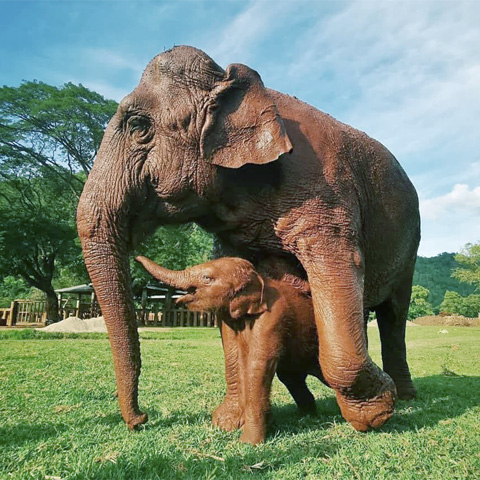
MAE MAI
born around 1990, female
Arrival at ENP: June 20200
For many years, Mae Mai had to do heavy labor in the timber industry. Then she was sold to an elephant riding camp. Her tiny daughter Wan Mai was born here on May 2, 2020 as a premature baby. Due to the Covid-19 crisis, the owner decided to sell mother and baby to another riding camp. Fortunately, Save Elephant Foundation was able to intervene and rescue the lovely pair. They have found a new home at Elephant Nature Park. So mother and baby will not be separated, and little Wan Mai will be spared the brutal “crush” that all riding and circus elephants have to endure. Mae Mai and her little daughter are embracing their new life and have settled in surprisingly fast. Meantime the benign old lady and most experienced nanny Sri Nuan has joined the little family and delights in looking after the little one, so that Mae Mai can take time off and relax.
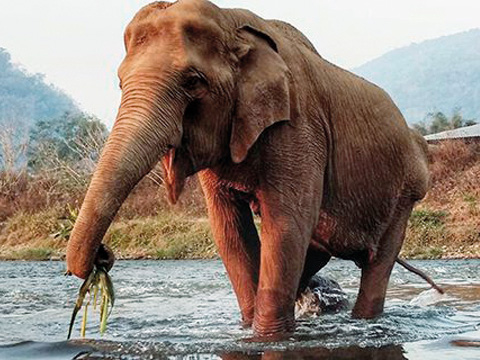
MEDO
born about 1980, female
Arrival at ENP: June 2006
When Medo was in her teens, she worked in illegal logging. She suffered a badly broken ankle during that time, which did not heal well, limiting her ability to work. She was sold to a new owner who used her for forced breeding. He chained Medo and brought a bull to her, but the bull attacked Medo, dislocating her hip. So Medo ended up at a remote village where Lek discovered her, doing heavy labour as the “village tractor” in spite of her injuries. At ENP Medo gets along fine, she can lie down, get up, roll in the mud and she enjoys bathing in the river. She is a survivor and does not feel sorry for herself. Medo has two rather dramatic best friends, Mae Lanna and Sao Yai. She is a calming influence for them.
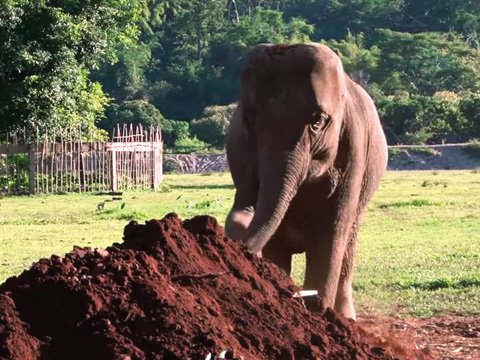
CHANA
born about 2011, female
Arrival at ENP: early 2019
This charming elephant girl had to work in street begging and as a "clown" for tourists. Chana suffered a broken bone in an accident and was brought to ENP by her owner to recover. She was instantly smitten when she met Kabu, who had been keeping to herself up until then. Chana and Kabu have been inseparable ever since - and Chana has become playful and adventurous with Kabu always looking out for her. An orphan and a mother elephant who has lost her children have found each other.
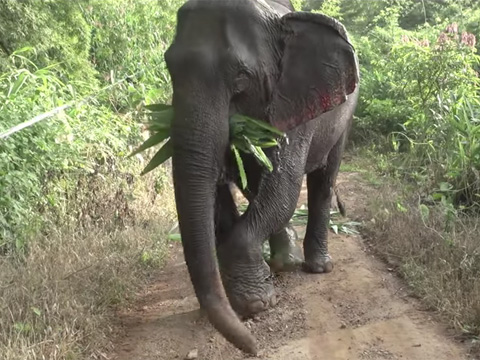
KABU
born about 1990, female
Arrival at ENP: September 22, 2015
As a baby, Kabu had to accompany her mother who worked in logging, hauling timber. When Kabu was two years old, a log rolled out of control and broke her front left leg. The injury healed badly and left her handicapped. When she was older, she had to work in logging herself and was also subjected to forced breeding. Kabu had two babies. The little bull died soon after his spirit was broken. Her daughter was sold into the elephant show industry. At ENP Kabu gets along well, despite her handicap. When Chana arrived at ENP, it was love at first sight between the two, and it is heartwarming to see how dedicated Kabu is to her young protégé.
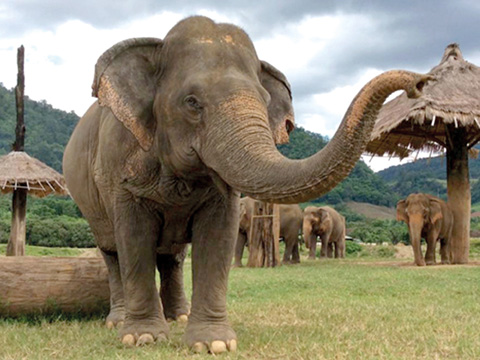
JOKIA
born about 1960, female
Arrival at ENP: August 1999
Jokia has endured many years of hard labour and abuse in the logging industry. While dragging a log uphill, she miscarried - but wasn’t allowed to stop and check if the baby was alive. This event caused Jokia extreme physical and emotional trauma and she refused to go back to work. As a result, she was deliberately blinded. At ENP, Jokia is much loved because of her gentle nature, and she formed a beautiful friedship with Mae Perm, who always guided her and reassured her with her trunk. After Mae Perm died, Jokia was heartbroken – but in the meantime has found a new best friend in Sri Prae. The two of them enjoy their time together, often loudly trumpeting and squeaking.
www.facebook.com/lek.chailert/videos/2798542380273085/
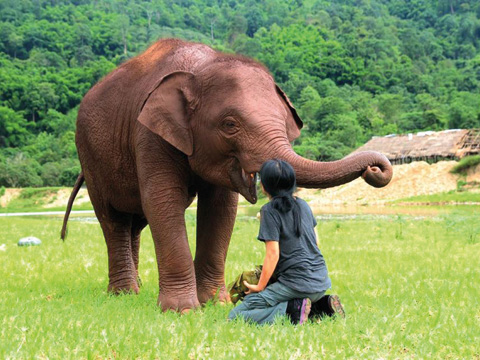
THONG AE
Year of birth unknown, female
Arrival at ENP: August 2017
Thong Ae was separated from her mother when she was one year old to do street begging. Later she worked in a camp near ENP. After one of her nannies died, Thong Ae suffered a lot and did not recover, so that her owner brought her to ENP. The little girl won many hearts there and with her sweet and friendly manner quickly became a favorite of many nannies. Thong Ae is best friends with baby Dok Mai, and also likes playing with the little bull Dok Geaw. She also visits Sri Prae and Jokia, and spends time with them taking mud baths.
www.youtube.com/watch?v=agxeynDrzIs
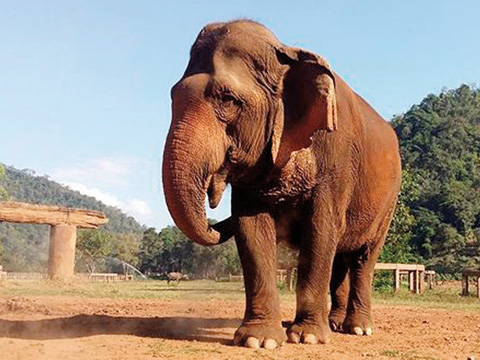
SRI NUAN
born about 1962, female
Arrival at ENP: January 2006
Sri Nuan had to work hard in the logging industry and did not have enough time to feed. When she was looking for something to eat while she was working, she was shot with a slingshot. As a result, she lost her left eye. Afterwards she carried tourists in a trekking camp, her last job was street begging. Sri Nuan could only spend eight months with her baby before it was sold to an elephant show in Phuket. Upon arrival at ENP, she immediately joined a herd and has become the super nanny of several babies since, and aunty for Chang Yim and Faa Mai. When baby Wan Mai and her mother Mae Mai arrived in June 2020, Sri Nuan fell in love immediately and became Wan Mais nanny.
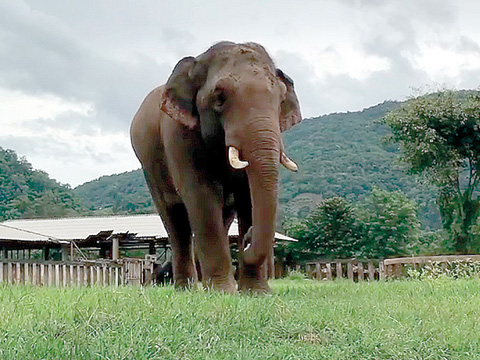
THONG SUK (JUNGLE BOY)
born about 2000, male
Arrival at ENP: May 2003
Thong Suk's mother Mae Boon Na had to work in a trekking camp. When she was highly pregnant, the owner allowed her to come to Elephant Haven - a Save Elephant Foundation project in Kanchanaburi - to rest and give birth. After four months, his mother had to go back to work and the little bull had to follow her while she was giving rides. Fortunately, Thong Suk, whose name means “Golden Happiness”, never had his spirit broken. At the age of 1 ½ years he was rescued to ENP, and his mother could stay there with him for another year, before unfortunately she had to go back to work. After he developed a keen interest in elephant ladies, Thong Suk moved into a large enclosure that he shares with the younger bull Chang Yim.
NEWS ABOUT THE ORPHANS
Read our report from March 2022 (German)
Read our report from June 2021 (German)
Read our report from September 2020 (German)
Read our report from August 2020 (German)
Read our report from April 2020 (German)
Read our report from February 2020 (German)
BACKGROUND
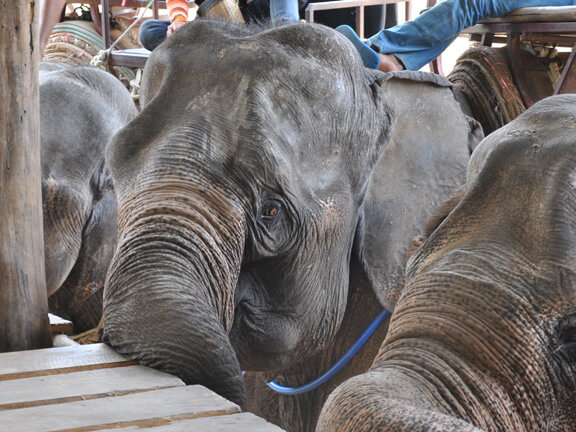
In Thailand there are only about 1500 elephants left in the wild. More than 2500 elephants are living in captivity, harshly exploited for the tourism industry, forced breeding, and illegal logging. In order to put an end to the immense suffering of captive elephants and also save the remaining population in the wild, it is vital to educate the public about the plight of the sensitive pachyderms and also stop the abuse. The fact that there is profit to be made out of “using” elephants for various purposes poses an imminent threat to the wild population as well. At the same time, it is of vital importance to protect the remaining habitats.
The Horror of Phajaan („The Crush“)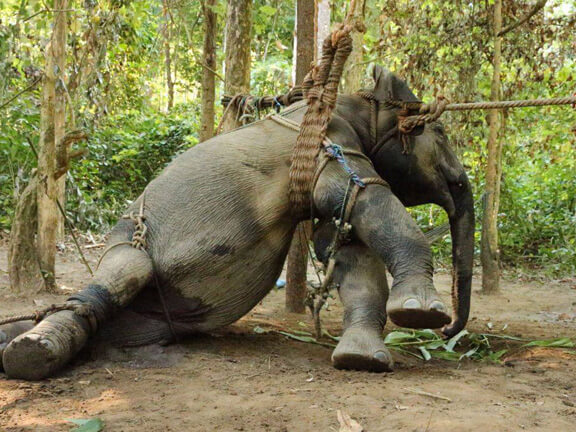
Every single elephant that is forced to give rides, perform tricks or paint pictures has suffered unimaginable torture at a very young age. The horrifying procedure of Phajaan (the crush) has been practised in Asia for centuries. Baby elephants are shackled into a narrow “crush box” and tortured for days or weeks. They are beaten on the head and other sensitive body parts with a pointed metal hook, nails are being driven into the highly sensitive ears and feet, fire and excessive noise as well as the withdrawal of food and water are used to inflict further pain and panic – and “crush the spirit” of the baby elephants. Many baby elephants die from the abuse. The ones that survive will never forget the Phajaan. The extreme experience of pain and submission can later be triggered merely by a movement of the arm or slight touch with the hook.
The Change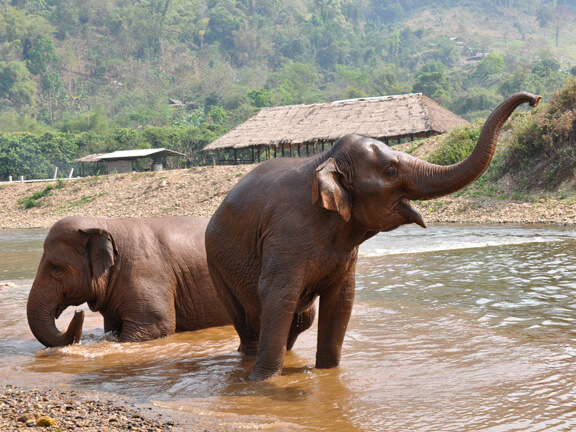
Meanwhile the reality of Phajaan, formerly hushed-up, has become a public issue – and earned massive criticism. This is largely due to the dedication and determination of Lek Chailert, who is leaving no stone unturned to improve the situation of elephants. Many elephant camps around Chiang Mai in the north of Thailand have stopped doing elephant rides. They advertise with slogans like “no hook, no chain, no riding” and offer elephant-friendly activities: Guests can walk with the elephants, feed them and watch them mud bathing or splashing in the river. In the tourist areas in the South of Thailand the change is still at the early stages. But this is an important step leading to a better future for elephants.
The Saddle Off Concept 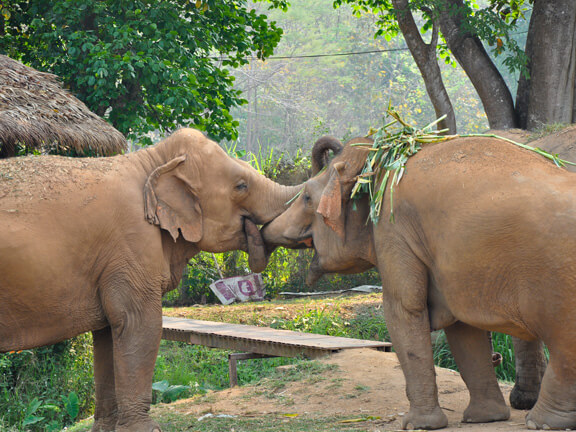
The founder of the Save Elephant Foundation Lek Chailert negotiates with the owners of existing elephant camps and offers them concepts, incentives and cooperations in order to motivate them to shift to a more elephant-friendly program. A considerable number of camps have done this already! The tourist seem to higly appreciate the experience of watching happy elephants, doing what elephants like to do. Lek is also working outside of Thailand in order to promote the change, i.e. in Laos or Cambodia.
Sanctuary for Elephants and other Animals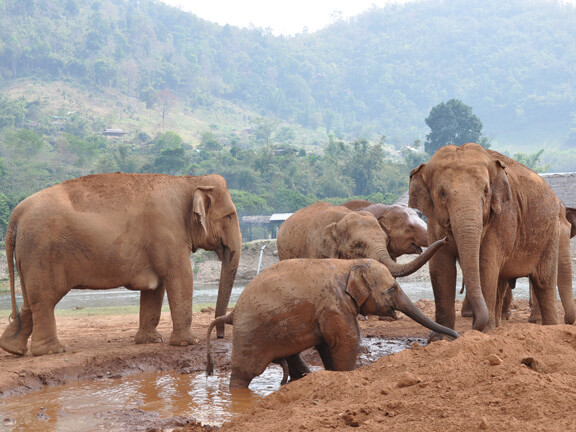
Many people who have visited Elephant Nature Park consider it a magical place. About 80 elephants rescued from abuse have found a refuge, where they can find a new lease of life and rediscover their elephant spirit. Nearly all of them suffer from severe physical and psychological trauma when they arrive. Even more important than the loving care and medical treatment each individual receives are the “healing powers of the herd”: Most of the newcomers are integrated in one of the existing small groups or even a herd, or they find a friend for life among their fellow pachyderms. Watching these affectionate bonds is one of the most touching experiences in ENP.
Cooperation with local Communities
The ENP offers numerous possibilities for the members of local communities to make a living. Many work there as mahouts, building and maintaining houses, stables oder fences, preparing the food etc. Lek has encouraged the farmers to plant organic fruit and vegetables and buys the produce off them, feeding the elephants as well as staff, volunteers and guests. The food is completely vegan and tastes incredibly good. There is also a sustainable jungle-coffee project. The coffee plants are grown under the trees, so that the forest stays intact.
Some women from the local communities offer traditional Thai massage in ENP, and may keep 100 % of the proceeds. This also goes for the women who are offering washing service for the volunteers. A dance project where women and girls practise traditional dances and do shows for the guests is also a success. The mahouts carve wooden elephants that are sold in the ENP souvenir shop and also get the full price for their work.
ENP: Strategy and Plans for the Future
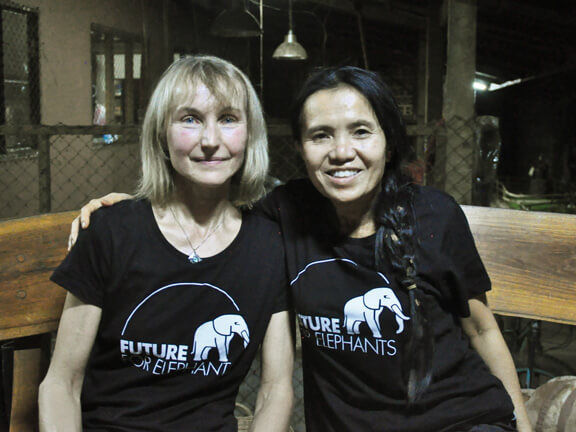
The visitors of ENP not only experience happy elephants in beautiful surroundings, they are also informed about the plight of elephants in Thailand and Asia. The often tragic backgrounds of the elephants rescued from the tourism industry, logging or forced breeding, impressively illustrate the desperate situation of the gentle giants. After their stay at ENP, many guests and volunteers are inspired to spread the message and create awareness back home in their own countries.
In the near future Lek and her husband Darrick are planning to move a part of the elephants into big, fenced-in areas where they can live half-wild. This is possible for two biggish and well-functioning groups of elephants - including babies – that are not in need of specific medical care; and also for the three adult bulls living in separate enclosures as yet. A part of the required land has already been purchased. Another piece of land suitable for the purpose has been located, but not yet financed.
If you would like to support the projects of Lek Chailert you can donate here, adding the keyword “Lek Chailert”: DONATE
ELEPHANT ABUSE FOR THE TOURISM INDUSTRY
The following pictures show how elephants are still abused for tourism in Thailand. The bullhook is always present. Each elephant on which a tourist rides or with whom a tourist poses for a photo was snatched from his mother at a young age and tortured in a crush box until he lost his will. The elephants who survived this "Phajaan" procedure recognize their mothers no longer.
RELATED LINKS
Corona Crisis
The aggravation of the situation for the elephants in Thailand and the fight Lek Chailerts, Süddeutsche Zeitung, 22 April 2020:
Discarded attractions
Documentaries about Phajaan
Elephants are tourist attractions in Thailand. Holiday-makers gather around the actually wild animals to ride and to pet them.
For the first time in a long period, animal rights activists are now documenting how cruelly the pachyderm's will as a young animal is broken in order to make it submissive:
www.n-tv.de/21870534
Media reports about Lek Chailert and her work
"Sehen aus wie Zombies" - Report by Iris Koch, Cannstatter/Untertürkheimer Zeitung, 11 May 2019 (PDF)
www.thaizeit.de/thailand-themen/news/artikel/ruehrstueck-the-surin-project-elefanten-retterin-lek-chailert.html
surinproject.org/index.php/about-surin-project/
www.20min.ch/leben/reisen/story/Ihr-Leben-sind-die-Elefanten-17884177
www.saveelephant.org
www.saveelephant.org/myanmar/

